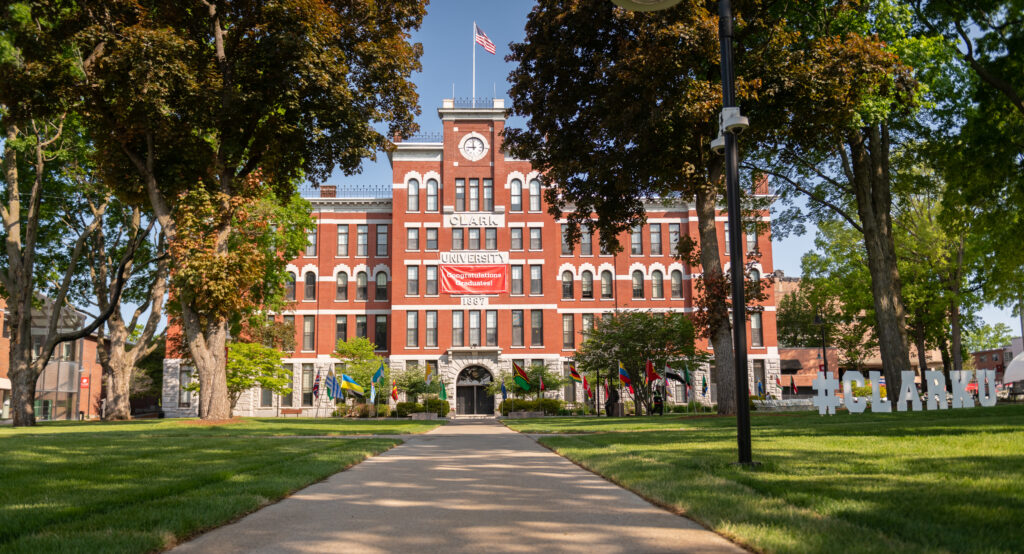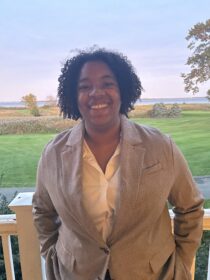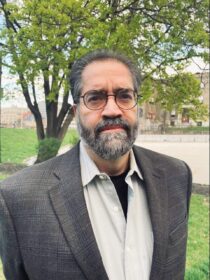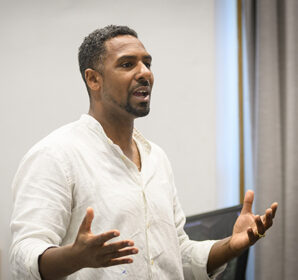‘Inclusion is a way of life’

Five members of the Clark community have been recognized for their commitment to advancing equity, inclusion, and diversity on campus and beyond.
Recipients of the 2023 President’s Achievement Awards for Inclusive Excellence (PAAIE) are Mia Davis ’24; MiKayla Dotson ’23; Ramón Borges-Méndez, professor of community development and planning and director of the urban studies concentration; Jie Park, professor of education and director of the Center for Gender, Race, and Area Studies (CGRAS), and Ousmane Power-Greene, professor of history and director of the Africana studies concentration.
The annual awards recognize people, units, or programs that contribute to the advancement of inclusive excellence at the University and in the Worcester community. Awardees designate a $1,500 gift to a program or department of their choice, supporting Clark’s shared commitment to equity, inclusion, and diversity.
Members of the Clark community can nominate undergraduate and graduate students, faculty and staff, student organizations, campus offices, departments, centers, academic or administrative programs, and Clark partnerships within the broader Worcester community.

Mia Davis ’24
For Mia Davis, diversity and inclusion work is about much more than amplifying the voices of historically underrepresented people.
“It’s also about listening, understanding, hearing one another, and doing the work necessary to make a space more equitable,” she says. “It’s about decreasing harm, increasing care, and providing opportunities for all voices and perspectives to be heard and recognized.”
Davis, who majors in English and community, youth, and education studies (CYES), was one of four student organizers for the Equity in Action Conference held at Clark in November.
She also collaborated with education Professor Raphael Rogers to host an African American read-in, creating space for students, staff, and faculty to discuss representation in children’s books. Davis is the co-president of the Black Student Union and has worked with fellow executive board members to increase the organization’s presence on campus and plan events for students to connect with faculty, staff, and alumni.
In the upcoming academic year, Davis will be a mentor for the Office of Identity, Student Engagement, and Access Connections@Clark program, supporting first-year students of color during pre-orientation programs.

MiKayla Dotson ’23
Psychology major MiKayla Dotson has served as the president of the Clark Athletics Inclusion Coalition, the education chair of the Black Student Union, and an admissions student ambassador during her time at Clark.
As a research fellow at the Mosakowski Institute for Public Enterprise, Dotson researched digital mental health initiatives. She also created the Clark University Guide app with Charlie Trey-Masters ’23 to help first-year students find resources on campus.
“Inclusive work is not only compassionate, targeted work, but is also creative and innovative work to establish and build solutions for a better future. It is essential to how we live and interact in the world,” says Dotson. “It is an honor and privilege to be recognized for this work with other amazing students, staff, and faculty.”
PAAIE has honored Dotson twice before, for her roles with Rise for Racial Justice in 2021 and with the Clark Athletics Inclusion Coalition in 2020.

Professor Ramón Borges-Méndez
Borges-Méndez takes pride in his long-term commitment to inclusion, something he practices in both his professional and personal lives.
“For me, inclusion is a way of life,” he says. “As we have seen in the last few years with the rise of powerful conservative coalitions, inclusion cannot be taken for granted. Certainly, there has been progress in inclusion and greater understanding about the fact that inclusion and diversity make us better human beings and citizens, yet new challenges are always rising.”
Borges-Méndez teaches graduate courses on food systems, inequality, labor economics, migration, and globalization. In addition to his academic roles, he has been a member of the Center for Excellence in Teaching and Learning (CETL) Advisory Board, The Mosakowski Institute’s Advisory Board, and the Graduate Board.
Borges-Méndez is also the co-founder of Fundación Bucarabón in Maricao, Puerto Rico, where he is the director of development. In Worcester, he is co-chair of the board of the Worcester Common Ground Community Development Corporation.

Professor Jie Park
For Park, the daughter of Korean immigrants and a woman of color, diversity, equity, and inclusion in higher education is deeply personal. She aims to advance racial justice through her work.
“I recognize that who I am, what I teach, and how I show up for my students — white and BIPOC — are also political,” she says. “From working alongside student organizers and faculty and staff colleagues, I have learned that social change requires education, community and coalition building, and direct action to change structures, policies, and practices. But at its core, we need relationships of radical care and trust.”
Park says her social justice efforts are always in tandem with others. She cites the valuable work being done by campus groups including the FIRM Food Pantry, CGRAS, CETL, CYES, the Difficult Dialogues program, and the antiracist praxis group.
She is a recipient of the prestigious Spencer Foundation/National Academy of Education Postdoctoral Fellowship Award and Clark’s Hodgkins Junior Faculty Award and Rosalind S. Roberts Faculty Award.

Professor Ousmane Power-Greene
Power-Greene believes diversity and inclusion work is central to what it means to be a caring and enlightened person.
“In all that I do, I am constantly trying to open doors and pull down barriers to equal access for all people,” he says. “I’m passionate about challenging those structures and institutional norms that perpetuate inequality and inequity.”
Power-Greene said he was particularly thankful for his fellow awardees’ leadership.
“Jie Park has led CGRAS – a hub for inclusive excellence – during a particularly challenging past three years with COVID and administrative transitions,” he says. “It’s been an honor to work alongside faculty in CGRAS, as they have offered me crucial insights about how our campus community can move toward being a more inclusive educational institution.”
Power-Greene’s debut novel, “The Confessions of Matthew Strong,” was published by Other Press/Random House in October. The novel is rooted in fifteen years of research and writing about the history and legacy of white supremacy.
“As a scholar and teacher of black social and political movements, I’ve been dedicated to learning and teaching about how people have resisted discriminatory practices and policies, as well as the violence that has accompanied these practices and policies,” he says.


